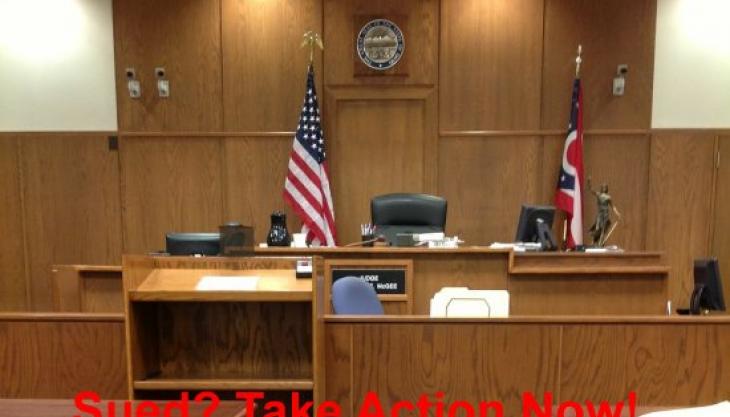What to Do if You're Sued by a Creditor Over Debt
Submitted by Rachel R on Mon, 05/25/2015 - 11:24am

If you get notice of a lawsuit, act immediately!
Image Source: Pixabay.com
If you get a notice in the mail that you're being sued by a creditor, it's not something to take lightly. In some cases, a debt collector may threaten a lawsuit then never follow through. Just because a creditor or debt collector says they will sue you doesn't mean they will. If they are still in the “making threats” phase, you still have time to work things out and figure out how to pay the debt or get rid of it.
After you get notice of a lawsuit
But once you get notice that a lawsuit has been filed, it's time to sit up and take notice. The first thing to do is to not ignore it. Sticking your head in the sand will not make the lawsuit go away. Instead, you need to respond to it right away. You can do this on your behalf or with the help of an attorney. Likely if you can't afford to pay a debt, though, you also can't afford an attorney to fight it for you.
It's relatively straight forward to respond to a lawsuit filed by a creditor. Usually you have about 20 days from the date you were delivered the notice – not the date that it was drafted or mailed. Pay close attention to the date. When you answer, you should not admit that what the creditor says is true. That's just begging for the court to issue a summary judgment for them. Even if you can't pay, still respond.
What to say in a lawsuit response
You do not have to write your response in fancy legal language. In fact, it's better if you use plain English so it's clear to the court what you're stating. It can be written neatly by hand, but typing it up and printing it is preferable. Double check the account number they list and check the balance they say you owe. If the balance doesn't agree with your records, say that.
If the account number is wrong, say that you do not have any knowledge of that account number. Anything you can say to weaken or call their claim into doubt is perfect. If they overcharged you on interest or fees, dispute the amount based on inaccurate charges. Use the header of the lawsuit notice as a template for your response, be sure to include the following:
- Name of the court (superior court, small claims, etc.)
- The state of North Carolina and the county
- The name of the creditor that filed the suit (list them as plaintiff)
- The case number (this is critical to include)
- Your name (list yourself as the defendant)
You should admit to what is true. For instance, “I (your name) admit that I live in --- County in North Carolina” at the given address and “I had a credit agreement with (creditor name).” Then deny what's not true. “I deny that I owe $xxx amount. This does not agree with my records”. Or if they list an incorrect account number, says, “I have no knowledge of this account number with this creditor.” Then sign and date the response.
Why you should respond to a creditor lawsuit
Responding buys you time, allows you a day in court to propose a payment plan or negotiated lower settlement amount or allows you time to file bankruptcy (if you have many debts you can't pay). A response also puts the ball back into the creditor or debt collector's court and forces them to prove that you owe what they say they do.
In many cases, a debt collector may not be able to prove what you owe and that they have a right to it. If you call their right to collect into doubt and they can't prove it, the case can be dismissed. The lawsuit may also come with a request for a Declaration of Income and Assets. This will show the court what you can afford to pay. Fill this out honestly so you don't get in trouble with the court!
How bankruptcy helps
If you have a pile of debts you can't pay, are living paycheck to paycheck and can't seem to get caught up, it may be time to consider filing bankruptcy. A Chapter 13 can give you more time to pay off your debts, and a Chapter 7 can wipe out most of your unsecured debts like credit cards and medical bills. This can be a fast and permanent way to make creditor lawsuits go away.
Contact the law offices of John T Orcutt for a free consultation with a North Carolina bankruptcy expert today. Call +1-833-627-0115 and be sure to ask about our zero down bankruptcy specials!
Debts Hurt! Got debt? Need help? Get started below!
Serving All of North Carolina
- Bankruptcy Attorneys Raleigh NC (North)
- Bankruptcy Attorney Fayetteville NC
- Bankruptcy Attorney Durham NC
- Bankruptcy Attorneys Wilson NC
- Bankruptcy Attorneys Greensboro NC
- Bankruptcy Attorneys Southport NC
- Bankruptcy Attorneys Wilmington NC
Bankruptcy Attorneys Raleigh NC (North)
6616 Six Forks Rd #203 Raleigh, NC 27615 North Carolina
Tel: (919) 847-9750

Bankruptcy Attorney Fayetteville NC
2711 Breezewood Ave Fayetteville, NC 28303 North Carolina
Tel: (910) 323-2972

Bankruptcy Attorney Durham NC
1738 Hillandale Rd Suite D Durham, NC 27705 North Carolina
Tel: (919) 286-1695


Bankruptcy Attorneys Greensboro NC
2100 W Cornwallis Dr. STE O Greensboro, NC 27408 North Carolina
Tel: (336) 542-5993

Bankruptcy Attorneys Southport NC
116 N Howe St. Suite A Southport, NC 28461 North Carolina
Tel: (910) 218-8682

Bankruptcy Attorneys Wilmington NC
116 N. Howe Street, Suite A Southport, NC 28461 North Carolina
Tel: (910) 447-2987
